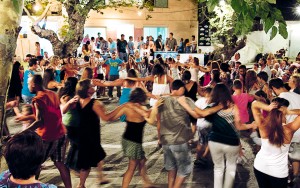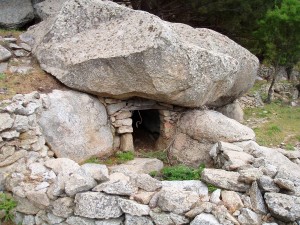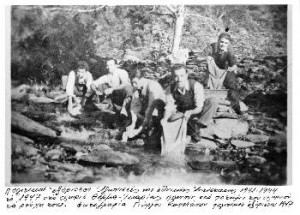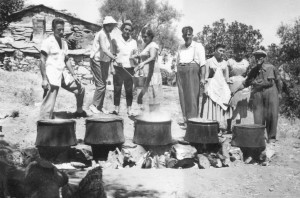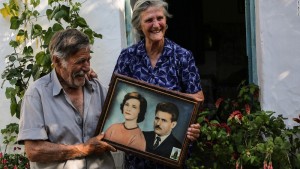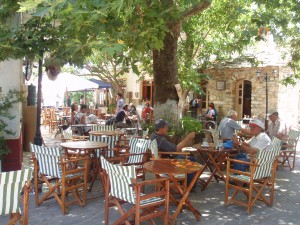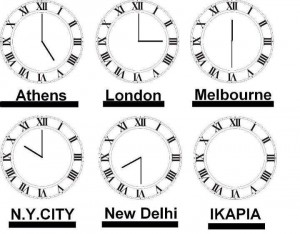In Ikaria the clocks tick differently.
Ikaria is one of the Blue Zones, have you heard of it? These are places where seniors live with vigor and vitality into a biblical old age. Dan Büttner, an American health guru, coined the term Blue Zones and conducted several studies in Ikaria together with National Geographic. But I’ll get to that below. First of all, a few words about the island itself, because its history has had a significant impact on the residents’ attitude to life.
An old man once said to me: “She is like a beautiful, unknown woman.” She the island. “At first she seems distant and unapproachable, but if you make the effort to approach her, you will first become aware of her incredible wild beauty and immediately succumb to her charms!”
The beautiful unknown
I can already hear the prophecies of doom: just don’t advertise! If you write about it, it will become known and then it will no longer be beautiful!
Yes, of course, I say, ideally no airport, no asphalt roads, no electricity, no internet. The locals are supposed to live all year round like they did 100 years ago (on air and love, because you can’t survive on fishing and agriculture anymore!) so that you have a cool secret place for a two week vacation! Unemployment, the exodus of young people? How? But by the time one of you needs a doctor, you won’t find the “backwoods conditions” funny anymore…
Sorry, that’s exactly why I’m writing and promoting Ikaria! In my opinion, the risk that Ikaria will now be overrun by mass tourism is very small. Just because of the arrival. You really have to make the effort to want to come here and make some compromises. Only those who are willing to make compromises in the usual all-inclusive world do that anyway.
So we are again among like-minded people, nature and culture lovers, fans of the original Greece, who appreciate and respect the local population and their very special way of life.
A piece of authentic Greece
Ikaria is the cozy, unadulterated Greece of the 1970s. The people are simple, shy at first, but quickly become open and warm, and they are always happy to have a chat, even with tourists. Here you can still experience direct contact with the locals and the never-ending original nightlife, often with live music in cozy taverns, on the village squares at the Panigyria or simply unplugged in the small bars like in the good old days…
Every day is a celebration
Dancing together and the exuberance are not folklore, but living customs, and by the way, simply contagious! Ikaria has become known far beyond the country’s borders for its festive everyday life. The Panigyria/traditional dance festivals are celebrated together by all generations and are still the center of all cultural events today. Due to the geographical location, the way of life, music and attitude to life is influenced by Mediterranean and oriental culture.
There is something magical about Ikaria.
The Pirate Island
Ikaria is a mountainous island in the East Aegean Sea, near the Turkish coast, about the size of Lake Constance and the highest mountain is 1100m above sea level. M. The south side is rocky, barren and steeply sloping, but the north side is rich in water, lush, fertile and green.
With a population of 8,000 inhabitants, it’s not exactly densely populated. To be more precise, the first time you visit you have to really look for the hidden mountain villages in the landscape. When you take a trip into the densely forested hinterland, you usually only find a handful of houses around the village center and think: “Is that all?” The rest of the village is, so to speak, invisible. This saved the lives of the inhabitants in the Middle Ages, when piracy in the Aegean reached epidemic proportions. While other islands were literally depopulated by pirates and people were kidnapped to the slave markets, the inhabitants of Ikaria hid in the mountains, camouflaged their houses behind huge boulders and simply made themselves invisible.
A house with a sea view was deadly back then. This went so far that when there was a pirate alarm, the entire household contents were buried behind the house to create the impression of abandonment. That’s why you won’t find traditional craftsmanship anywhere on the entire island. It was always just about survival. Hence the connection people have to their music and dances. It was the one thing you always had on hand and could take with you in an emergency.
Survivor to this day
Ikaria had a hard and difficult past. The way of life of the ancestors extends to the present and connects people. Traditions, historical facts, harsh reality and its transfiguration interweave to form a unique worldview in which simplicity, serenity, freedom, generosity and community play the central role. The Ikariotes have remained survivors, to this day!
After the Second World War, the famine and during the systematic persecution of the communists at the end of the 1940s, the communist elite of the big cities were deported to various “re-education camps” or abandoned on exile islands. Ikaria was one of them. Sparsely populated, difficult to access and far from the beaten path. Between 10,000 and 15,000 communists, remember, almost twice as many as the native population, were exiled to Ikaria during the Greek Civil War. The exiled communists, accustomed to life in the city, had little chance of survival in the harsh climate on the remote, wild island.
The Banishment Island
The Icariotes themselves, accustomed to a meager life, immediately showed solidarity with those in need, even though they were forbidden from any contact under penalty of death. They left food, clothing and blankets for the exiles hidden in the forests, and so a close friendship and lively exchange of ideas arose, which to this day makes the island fervently vote red, i.e. communist. This earned it the name “The Red Rock”, for the Icariots a symbol of resisting injustice, helping themselves and showing solidarity with other people in need.
Mikis Theodorakis, probably the most famous exile, reports on his exile on Ikaria: “I feel warm when I think of Ikaria. The beauty of this island like a diamond in the rough and the simple warmth of the people. They opened their homes and their hearts to us.”
Live at your own pace
That’s how I experience them too, the Icariotes – hard shell, soft core. Warm people, cozy, friendly, living at their own pace.
The magic word is: Chalará – serenity – letting things come to you. Shaped by a past in which nothing was certain, nothing reliable and everything could always be lost in one fell swoop, people learned to savor the moment. Everything happens in the present and that’s all that matters. The Icariotes have a strong ability to be content with very little and to enjoy life despite all its hardships. Time can be enjoyed, given away, stolen, killed or wasted. Time always has exactly the meaning that you assign to it.
An absurdity in our fast-moving society. Time is money! Making time has become a religion. Efficiency is the magic word. We don’t have any time left! We are constantly stressed. Time makes us sick.
Icariotes have their own sense of time.
In Ikaria you become ancient
You hear that again and again. The island of the centenarians, where people forget to die because of the joy of life!
The rhythm of life of the inhabitants of Ikaria is legendary! You meet a lot of “old” people here who are very vital and independent. There was a lot of media coverage of this in Greece and around the world!
This living in the moment and this no-stress feeling of the locals is something special. Old people (just like children, by the way) are strongly integrated into society and are always and everywhere, so there is no reason to feel old and superfluous.
Age plays just as little a role as time
A life after the sundial
The last bastion of the real Blue Zones is the mountain village of Raches where people still live by the sundial. This has earned it the name “Asterix Village” across the country. The village that ticks differently, the residents are a little crazy, lovable and unique. A place where the rhythms of nature still determine everyday life. The tourist seaside resort of Armenistis, which belongs to Christos or Raches, is actually just a summer settlement for mountain residents. A lot has been written about Raches, reporters from all over the world made documentaries: everyone sleeps during the day and parties all night, goes the oft-quoted myth.
But the business hours are really unusual. As I said, they are based on the sun and not the clock! All shops open at 10:00 a.m. and stay open until 3:00 a.m. in midsummer!
The best time to drink coffee under the huge shady plane trees in the middle of the village square and watch the Greeks perform tavli is at Greek lunchtime, between 12:00 and 3:00 p.m., when the heat is at its highest. Women shop, the children stroll through the plaza after school, chattering loudly. After that, Siesta and the village are pretty much deserted. Between June and September it is also worth visiting in the evening after dark. I emphasize getting dark, because here you are guided by the setting sun and not by a specific time.
The evenings are most exciting in July and August, the main holiday season for the Greeks, because the village really comes to life after 11 p.m. It’s loud and lively everywhere, the taverns full of Greeks. You drink Tsipouro, the local home-made distilled wine, or the famous Ikariot wine. Small children play catch between the tables, and you can even shop in the numerous small shops until the early hours of the morning. I also have my little gift shop there and therefore speak from experience ;-)
For the young and the young at heart, it continues seamlessly in the cocktail bars until sunrise. In Raches you can really party all night long.
In Ikaria the clocks tick differently
You can experience this special way of dealing with time differently in Raches. In the small coffee shops or taverns you can just sit for hours without being constantly asked if you would like to order something else. There is no pressure to consume and the empty plates are not put away either. That would be a no-go for the Ikariotes and would be like being kicked out. The guest decides how much time he wants to spend here.
It can take just as long until a guest is entertained. This has nothing to do with laziness or negligence on the part of the host, but rather with his own discretion in letting the guest arrive first. You may object that it’s “bad for business,” but the phrase “time is money” doesn’t apply here, but rather “time is life.”
Because they know that time is more valuable than money, it is irretrievable.
As already mentioned, time takes on its own dimension and you can enjoy it without feeling guilty. Perhaps this is the core idea that makes the Icariots so “individual” and gives them a long, albeit simple, life.


